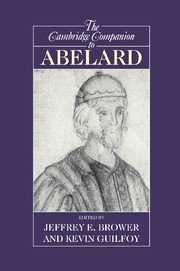5 - Logic
Published online by Cambridge University Press: 28 May 2006
Summary
A great deal of Peter Abelard's writing is concerned with what he regarded as logic, but which we would now classify as ontology or philosophical semantics. Following Cicero and Boethius, Abelard holds that properly speaking the study of logic has to do with the discovery and evaluation of arguments (LI Isag. 3.10). A necessary preliminary for this is an examination of the issues dealt with by Porphyry in the Isagoge and by Aristotle in the Categories, and De interpretatione (LI Cat. 113.26-114.30). In the present chapter, however, I will ignore most of this material and concentrate on the central issue of logical theory both for Abelard and for us, that is, on the nature of the relation of consequence, or following. Even with this limitation there is a great deal of ground to cover. Abelard sets out his theory of entailment and argument in two very extended and dense discussions both of which have suffered considerable textual corruption. The treatment of topics and hypothetical syllogisms in the Dialectica, is apparently the earlier. The other is the surviving fragment of Abelard's commentary on Boethius's De topicis differentiis, Glossae super De topicis differentiis, which seems to belong with his other commentaries on the works of the logica vetus published as the Logica “ingredientibus.” The two expositions disagree on some crucial questions, but here I will restrict myself almost entirely to the discussion in the Dialectica.
- Type
- Chapter
- Information
- The Cambridge Companion to Abelard , pp. 158 - 199Publisher: Cambridge University PressPrint publication year: 2004
- 23
- Cited by



